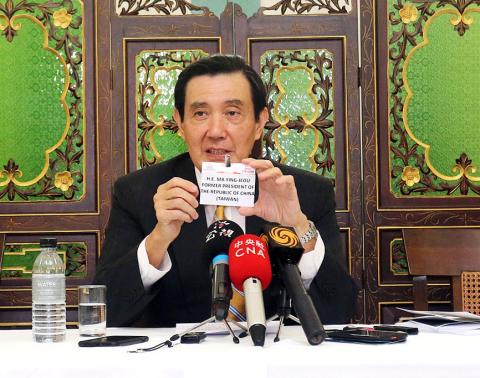Former President Ma Ying-jeou (馬英九) yesterday held a news conference in Malaysia to protest the World Chinese Economic Summit’s failure to acknowledge him as the former president of the Republic of China (ROC), Taiwan
At the summit earlier in the day, the program designated Ma as “H.E. Ma, Ying-jeou, World Chinese Leader,” or simply “H.E. Ma, Ying-jeou,” without a title, whereas all other heads of state were fully credited.
Refusing to accept the organizer’s arrangements, Ma attended the meeting to give his speech with his own tag, which read: “Former President of the Republic of China (Taiwan),” and introduced himself as such at the beginning of his speech in Malacca.

Photo: CNA
Hours after the speech, Ma criticized summit organizers, saying: “It is hard to fathom this kind of unfair and unreasonable treatment which harms me and also cross-strait relations. This attack on my personal dignity is unacceptable and I will fight for what is right.”
“It is apparent that intervention by the Chinese embassy in Malaysia caused this row,” Ma said.
He said that the invitation by Southern University College had clearly addressed him as a former president of the ROC, but a few days prior to his visit, “there were signs that things had gone wrong,” including questions from the organizers asking whether “world Chinese leader” could be used instead of former president.
Ma said his initial reply was that he would decline the invitation if the organizers insisted on not calling him “former president.” The college agreed at the time to designate him as such, but arrangements for his speech remained in dispute even after his departure from Taipei.
Presidential Office spokesman Alex Huang (黃重諺) issued a statement criticizing the organizers, saying the treatment Ma received was “extremely impolite and inappropriate” for the former head of Taiwan, demanding “an immediate apology and correction.”
In his speech, Ma said Taiwan-ASEAN ties are to become even closer as a result of Taiwan’s innovation and technology, the entanglement of Southeast Asian economies and the cultural links between Taiwan and Southeast Asian countries.
Under normal conditions trade relations are developed to pursue common interests and are not exclusive, he said.
Political and diplomatic factors affected Taiwan’s efforts to join regional trade arrangements, but ASEAN will support Taiwan’s participation in trade organizations and agreements, including the Trans-Pacific Partnership, the Regional Comprehensive Economic Partnership and the Free Trade Area of the Asia-Pacific, he said.
Taiwan’s advanced technologies play an important role in the global supply chain and bring advantages to all nations, Ma said, adding that when serving as Taipei mayor 13 years ago he advocated the nation’s inclusion in the ASEAN+3 as an informational member and he hopes Taiwan “will not wait 13 more years” to be a part of regional economic integration.
In response to a reporter’s question on the legal challenge the Chinese Nationalist Party (KMT) faces from the Ill-gotten Party Assets Settlement Committee, Ma said: “The KMT faced many difficulties in more than a century of history and I believe solidarity and reform have the power to change destinies, as Sun Yat-sen is the exemplar of KMT members.”
Additional reporting by Shih Hsiao-kuang

‘TAIWAN-FRIENDLY’: The last time the Web site fact sheet removed the lines on the US not supporting Taiwanese independence was during the Biden administration in 2022 The US Department of State has removed a statement on its Web site that it does not support Taiwanese independence, among changes that the Taiwanese government praised yesterday as supporting Taiwan. The Taiwan-US relations fact sheet, produced by the department’s Bureau of East Asian and Pacific Affairs, previously stated that the US opposes “any unilateral changes to the status quo from either side; we do not support Taiwan independence; and we expect cross-strait differences to be resolved by peaceful means.” In the updated version published on Thursday, the line stating that the US does not support Taiwanese independence had been removed. The updated

‘CORRECT IDENTIFICATION’: Beginning in May, Taiwanese married to Japanese can register their home country as Taiwan in their spouse’s family record, ‘Nikkei Asia’ said The government yesterday thanked Japan for revising rules that would allow Taiwanese nationals married to Japanese citizens to list their home country as “Taiwan” in the official family record database. At present, Taiwanese have to select “China.” Minister of Foreign Affairs Lin Chia-lung (林佳龍) said the new rule, set to be implemented in May, would now “correctly” identify Taiwanese in Japan and help protect their rights, the Ministry of Foreign Affairs said in a statement. The statement was released after Nikkei Asia reported the new policy earlier yesterday. The name and nationality of a non-Japanese person marrying a Japanese national is added to the

AT RISK: The council reiterated that people should seriously consider the necessity of visiting China, after Beijing passed 22 guidelines to punish ‘die-hard’ separatists The Mainland Affairs Council (MAC) has since Jan. 1 last year received 65 petitions regarding Taiwanese who were interrogated or detained in China, MAC Minister Chiu Chui-cheng (邱垂正) said yesterday. Fifty-two either went missing or had their personal freedoms restricted, with some put in criminal detention, while 13 were interrogated and temporarily detained, he said in a radio interview. On June 21 last year, China announced 22 guidelines to punish “die-hard Taiwanese independence separatists,” allowing Chinese courts to try people in absentia. The guidelines are uncivilized and inhumane, allowing Beijing to seize assets and issue the death penalty, with no regard for potential

There is no need for one country to control the semiconductor industry, which is complex and needs a division of labor, Taiwan’s top technology official said yesterday after US President Donald Trump criticized the nation’s chip dominance. Trump repeated claims on Thursday that Taiwan had taken the industry and he wanted it back in the US, saying he aimed to restore US chip manufacturing. National Science and Technology Council Minister Wu Cheng-wen (吳誠文) did not name Trump in a Facebook post, but referred to President William Lai’s (賴清德) comments on Friday that Taiwan would be a reliable partner in the